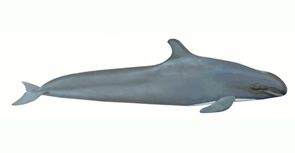Species Index


Key Facts
Length: Up to 6 metresRange: Tropical and warm temperate waters
Threats: Pollution, hunting, habitat degradation
Diet: Mainly squid and fish
False Killer Whale
Latin: Pseudorca crassidens
Physical Description
False killer whales have relatively slender bodies with a small, rounded head and no prominent beak. In adult males, the blunt melon can overhang the lower jaw. They can grow to six metres in length. The tall, curved dorsal fin can measure up to 40 cm high. Pectoral fins are relatively long and have a distinctive hump on the leading edge. The body is uniformly dark grey in colour except for a pale anchor-shaped marking on the chest; this marking extends in a narrow stripe down the belly. Some individuals may have scars from encounters with predators.
Habitat and Distribution
Though not abundant in any particular area, false killer whales have a wide distribution throughout tropical and temperate waters in all major oceans. They prefer deep waters although they are only known to occur offshore in the eastern Pacific Ocean. Sightings in the UK are rare and they are very rare in Hebridean waters.
Behaviour
Although they show aggression towards other cetacean species, false killer whales are gregarious and social, active at the surface, and may approach vessels to ride the bow wave. False killer whales are known for their mass stranding behaviour although there have been no strandings reported in the Hebrides.
Food and Foraging
False killer whales feed on a wide variety of prey including squid, octopus and fish. In UK waters, they feed on deep-dwelling squid and some fish.
Status and Conservation
False killer whales are the target of drive hunts in Japan, which take relatively low numbers each year by driving groups of whales towards the shore. Their habit of stealing fish from fishing lines makes them unpopular with fishermen and results in small numbers being culled each year. False killer whales are also subject to same threats as other cetaceans including pollution, noise disturbance and reduction in prey due to overfishing. False killer whales are protected under UK and EU law, principally under Schedule 5 of the Wildlife and Countryside Act 1981, the Nature Conservation (Scotland) Act 2004 and by the 1992 EU Habitats and Species Directive.





